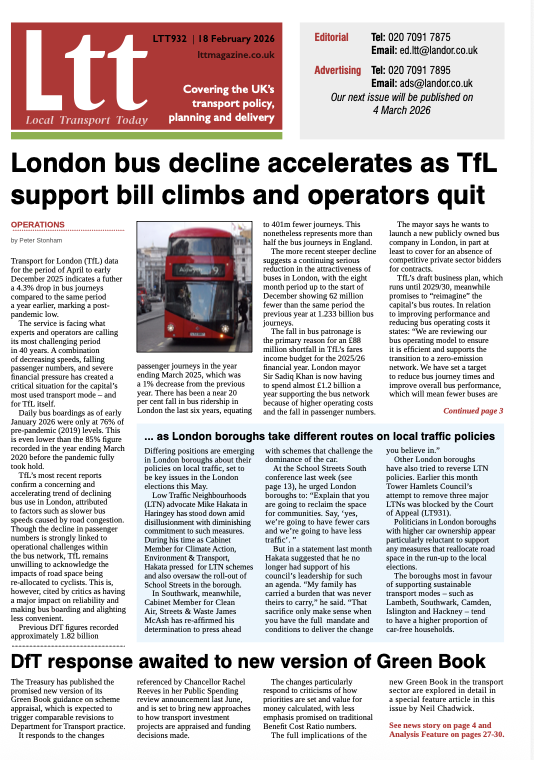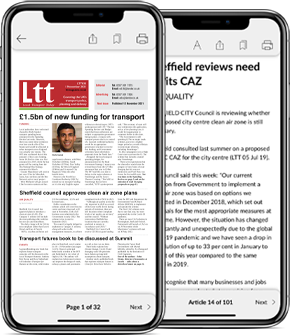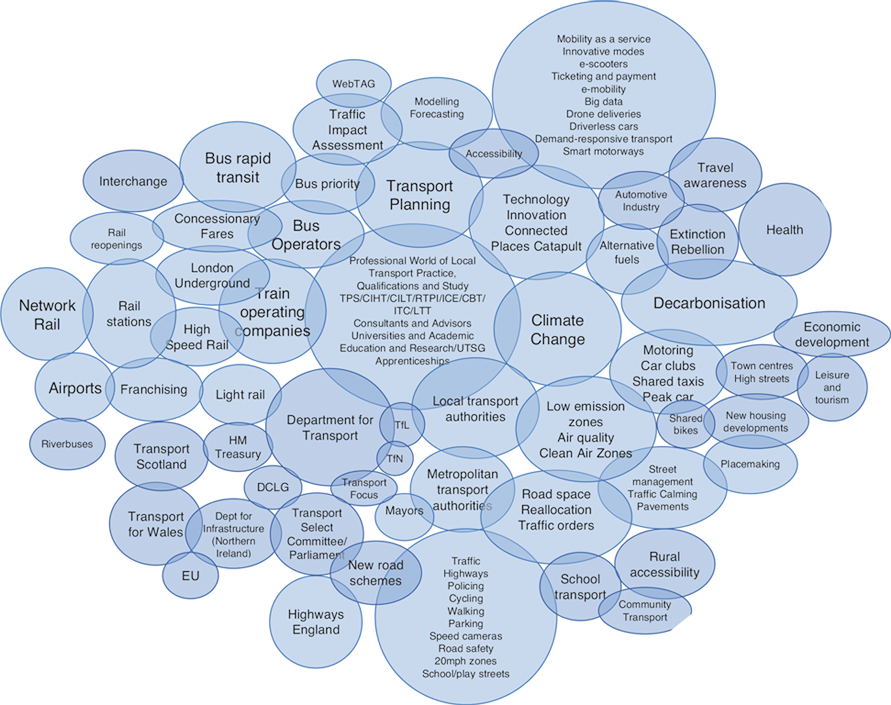
In LTT magazine, LTT932, available for subscribers to access.
Several interesting developments in this issue relate to newly released data. Our main story reports on the latest figures concerning bus operation and use in London just presented to the TfL Board. They show a continuing fall in usage acompanying a further reductionin journey speeds. Not only are these two factors related, but they have trigered a third, which is the financial cost, as reflected in TfL’s budget, with a significant loss of income. Other new data relates to the belatedly released evaluation reports of smart motorway projects by National Highways, prompting further controversy about their value for money and safety record.
A further data-related dimension in this issue is some new analysis from the National Travel Survey, looking into the subject of trip chaining, on which we invited three travel-behaviour experts to comment.
Another new release is the revised Treasury Green Book on appraisal, on which we also have a detailed review and commentary on its implications for the DfT’s own Transport Appraisal Guidance.
Other news include developments relating to Low Traffic Neighbourhoods and local speed policies, the impact of Oxford’s local congestion charge, new design and placemaking guidance from MHCLG, and some important highway, rail stations and technology matters.
Our expert commentator contribution in this issue is by John Dales, who considers the recent Government announcements on pavement parking and road safety, which he feels could have gone further. He senses an unwillingness to confront some established and selfish behaviour by motorists which is standing in the way of a better environment for both other road users and local neighbourhoods.
In his Editorial Opinion, Peter Stonham expresses concern about the need for clarity in taking forward the concept of vision-led planning, given the absence of consistent Government messaging that brings together wider considerations about transport decision-making. He feels this is essential in shaping local objectives and how they are to be delivered, and looks forward the early provision of some overarching and robust advice on the topic.
Access the latest issue here

To read the new LTT and all the valuable material in it, simply go to lttmagazine.co.uk/edition/. If you are a subscriber, you can log in to read the issue in full and/or print out a copy.
For anyone who is not a subscriber, there is a facility to quickly purchase access for either an individual issue or a monthly or annual subscription to LTT. And you will see that we have brought in attractive new lower prices, as we have promised, to reflect the switch to digital delivery. It is now just £75 to subscribe to LTT for a year as an individual or £7.50 per month.
The next issue will appear on 4 March 2026.

Want to subscribe? Got a question?
Have some news? Or want to contribute?

A 30-year journey
Local Transport Today has been providing a unique service of news, analysis and comment about everything relating to transport at urban, conurbation, rural and regional levels in Britain for over 30 years.
Founded as a magazine in 1989, it quickly became required reading for planners and transport managers in local authorities, transport service providers, consultants and specialist suppliers and all those researching and studying the challenges of providing mobility and accessibility for people and businesses all around the UK.
Over the years, conferences and seminars, online information resources and other networking and knowledge exchange activities - including an annual Local Transport Summit - have been added to the mix.
During the Covid-19 lockdown this year, LTT introduced a regular fortnightly series of online conversations which became must-attend discussions for those tackling the impacts of the pandemic on local transport.
The most recent innovative step has been the switch to digital publication including the LTT digital platform, providing an enhanced reader experience for you in accessing LTT content. This brings together the opportunity to read the complete copy of the magazine digitally - and print it out if required - with the facility to explore its contents as individual items. This platform is designed to suit both desktop and handheld devices. There are also direct links to all featured websites and email addresses mentioned in the magazine.

…and desktop viewing facility too

Plus you can print it too!
For those who still want to read the magazine as a paper product, we have designed it in an A4 print-friendly format, ready for you to print at home or in the office. You can print a whole issue or select and print certain pages.
Subscription benefit
The LTT digital platform includes a paywall — though for existing subscribers this will not affect access. All it requires is to simply log in with an email that is registered with LTT and click on ‘Forgotten?' to receive a new password to access your account.
For anyone who is not a subscriber, there is a facility to quickly purchase access for either an individual issue or a monthly or annual subscription to LTT. And you will see that we have brought in attractive new lower prices, as we have promised, to reflect the switch to digital delivery. It is now just £75 to subscribe to LTT for a year as an individual or £7.50 per month.
This full exceptional collection of material is not available anywhere else and continues the well-established LTT mission to be the only authoritative source for UK local transport professionals and practitioners!
Here’s what we cover for you
The UK Local Transport Eco-system at a Glance(!)
Transport issues and challenges are now a complex overlapping web of different localities, activities, modes, professional disciplines, technologies and financial and governance models. The LTT team uniquely understand this matrix and how all the different elements fit together.


